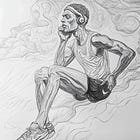My daughter has reached the stumbling age.
It’s that brief period when she's mastered walking just enough to keep falling—wobbly weeks when her legs turn noodle-like at random.
Most of the time, she's a good sport about it, dusting herself off to continue her toddler pursuits. But sometimes, after a harder spill, she needs a bit of consolation, as we all do.
I’m no wellspring of parenting wisdom; when she gets scuffed up, my toolkit of assurances is limited. So the first time she fell in front of me, and she looked up with betrayed eyes, I said the first thing that came to mind—a line from Batman:
“Why do we fall, Mo? … So we can learn to pick ourselves up.”
Cliché, sure, but there’s a simple beauty in that question from Batman Begins, spoken most tenderly by Alfred, the stolid proxy father of Bruce Wayne. Alfred serves as both servant and paterfamilias, provider of wisdom, mender and mentor of the Batman.
His words resonate both literally and metaphysically. We fall because that is the human condition—upright creatures defying the heavy reality of gravity. Evolutionarily speaking, we should be crawling, faces to the ground. And yet here we are, audaciously upright, looking to the stars.
Over the last decade, I’ve done my fair share of falling. As a clumsy runner, I trip often, especially during races. Once, I tumbled down a rocky slope during a national championship in the headlands above San Francisco, landing in a bloody shambles. Another time, I somehow managed to break a rib tripping over eucalyptus roots while running uphill. A couple of months ago, I tore open my knee hopping (unsuccessfully) over a chain at the top of Mount Tamalpais—an ache that now softly barks every few steps.
I hate falling because, to me, it always feels like failure. All that prep, all that directed pain of training, all that finely honed effort, calibrated over miles and miles—undone by a misplaced toe. C'est pas juste.
But footraces are not about fairness. The hardest-working runner rarely wins. Despite the honest simplicity of a dash from A to B, so much is left to chance: the risk of injury, the race dynamics, the arcane chemistry of hormones. And that is to say nothing of the great lottery of talent.
Yet, cosmic randomness has a flipside, offering moments of serendipity.
Consider the career of Des Linden, an American professional runner and Olympian. Linden has always been talented and disciplined, but when she left college, she wasn’t considered a generational talent. She finished her senior year 41st at NCAA cross-country and 23rd at the outdoor track 5K. Her entry into pro running was unheralded.
Gradually, though, she got—scientifically speaking—really damn good. She became a constant presence in the front pack, then she was hitting podiums, then she was qualifying for the Olympics, and then, on the nastiest of New England days, when a freezing storm humbled the favorites, she won the Boston Marathon.
Linden failed and failed. And each time, she picked herself up, adjusted, and kept grinding. Eventually, her number came up. It was serendipity, but only because she’d kept putting herself in a position to succeed.
I recognize that same tenacity in my daughter, whose very existence depends on countless improbable events aligning—a cascade of cosmic contingencies and chance encounters.
I like how this is put in Watchmen:
“In human coupling, millions upon millions of cells compete to create life, for generation after generation until, finally, your mother loves a man … and out of that contradiction, against unfathomable odds, it's you—only you—that emerged. To distill so specific a form, from all that chaos. It's like turning air into gold.”
We are, everyone of us, the product of such extraordinary chance. It explodes the mind.
So I am sorry to say that the arc of the moral universe does not bend toward justice. History bends toward chaos. And yet, within this, there is always the pregnant possibility of chance.
That’s why you must keep showing up. Because fortune, like gravity, goes both ways. The cookie crumbles on the floor as often as it lands on the plate. So, take courage, come back, even when you fail. Again and again, keep getting up.
You’ll need to improve. Your tactics will need adjustment, or maybe you need more time to grow. Perhaps you need a new strategy or the humility to understand why others keep besting you. But you must keep going.
Only by showing up do you give yourself the chance to seize the moment when the stars—those cruel alien stars, unaware of our existence—finally align. When that happens, you’ll be ready: scarred and tested, hardened by a thousand setbacks. Your knees will be scuffed. Your legs will be sore. And you will finally take your place in the sun.
Onwards.
Recently from Footnotes
Notable Notes
That’s it for this week. Coming up: the long history of how we became obsessed with morning routines.











…cheers to falling and loving it…
Good one!